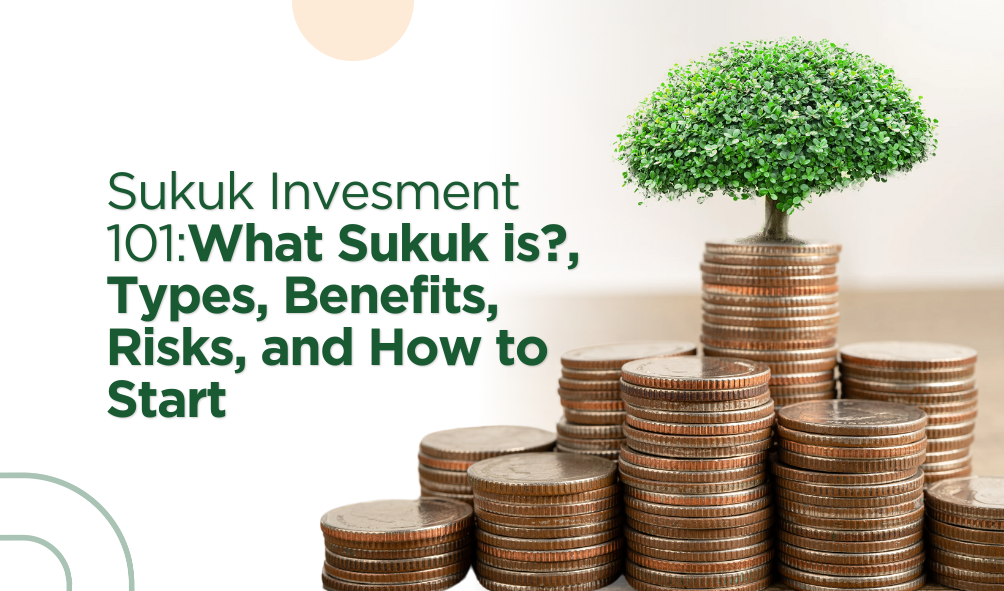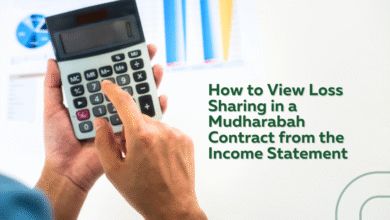Sukuk Invesment: What Sukuk is? Types, Benefits, Risks, and How to Start
In the global financial market sukuk also known as Islamic bonds have grown in popularity as an investment choice. These financial products provide investors with a moral substitute for traditional bonds since they adhere to Islamic principles. Both Muslim and non-Muslim investors looking for opportunities that fit with their values and offer a steady income stream are catered to by them. Making wise decisions and optimizing returns on sukuk investments requires knowing what to look for.
Knowing Sukuk
Financial certificates called sukuk signify ownership of real estate services or particular projects. Since earning interest is forbidden by Islamic law sukuk differ from traditional bonds in this regard. Rather profits are made through rental income or profit-sharing which guarantees that the investment is supported by real economic activity. Sukuk differs from traditional debt instruments in that it is an asset-based structure that encourages risk-sharing between the issuer and the investor.
Various Sukuk structure types
There are numerous structures for sukuk each tailored to the specific requirements of investors. Common types include:.
- Ijarah (Lease-Based Sukuk): This type of Sukuk generates rental income for investors by selling and leasing back an asset.
- Joint venture Sukuk or musharakah: a partnership in which investors share profits and losses according to predetermined ratios.
- Murabaha: An asset is sold at a predetermined profit margin in a simple transaction known as murabaha (Cost-Plus Financing Sukuk).
- Salam:sukuk that contains order of specific items with payments are made in advance for items that will be delivered later.
- Istisnaa (Construction/Manufacturing Sukuk): Funding for the development of assets with installments buy due as the project moves forward.
Every structure has distinct qualities that accommodate different risk tolerances and investment preferences.
Also read:Massive Potentials of Istishna’ Contracts in Islamic Financing
Important things to think about when investing in Sukuk
A number of considerations should be made when assessing sukuk as an investment option.
- Creditworthiness of the Issuer:. The sukuk issuers creditworthiness and financial stability are crucial. A strong track record and a high credit rating which generally denote lower default risk are important factors for investors to consider. underlying assets.
- Underlying Assets: The sukuks risk and return are greatly influenced by the kind and caliber of assets that support it. Stable returns are frequently offered by assets that produce steady income like infrastructure or real estate.
- Market liquidity: The ease with which an investment can be purchased or sold on the secondary market is known as liquidity. Investors can more easily exit their positions with highly liquid sukuk without suffering sizable losses.
- Adherence to Sharia principles: Islamic financial principles must be closely followed by Sukuk. Making sure the investment doesnt involve any illegal businesses or activities like gambling alcohol or interest-based lending is part of this.
- Governmental and Economic Stability: The political and economic climate of the issuing nation frequently affects how well sukuk perform. Investment dependability can be improved and risk can be decreased by stability in these areas.
- implications for taxes: Regarding taxation sukuk is treated differently in various jurisdictions. To calculate the investments net returns it is crucial to comprehend the tax ramifications.
benefits of investing in Sukuk
A number of benefits make Sukuk a desirable choice for investors.
- Ethical Investment: Sukuk adhere to the principles of socially responsible investing steering clear of sectors and activities that are thought to be detrimental or immoral.
- Diversification: By adding assets with distinct qualities from traditional bonds sukuk can diversify a portfolio and lower overall risk.
- Stability: Sukuk frequently offer steady revenue streams via rental or profit-sharing payments making them a dependable source of returns.
- Asset-Backed Security: By lowering the risk of complete loss the backing of physical assets gives investors a safety net.
Also read:Creative Economy Financing through Crowdfunding
Sukuks Associated Risks
Even though sukuk have many advantages there are risks involved.
- Market Risk: Sukuk like any other investment are susceptible to price swings brought on by shifts in the market.
- Credit Risk: In areas with unstable economies there is always a chance that the issuer will default.
- Liquidity Risk: It may be more difficult to sell the investment without a discount in certain situations due to an undeveloped secondary market for sukuk.
How to Start Sukuk Investment
Working with financial advisors or organizations that specialize in Islamic finance is advised for those who are new to sukuk investments. Based on their risk tolerance financial objectives and ethical considerations these experts can help investors choose the best sukuk. Sukuk funds which combine resources to invest in a diverse portfolio of sukuk are another option available to investors. These funds lower risk while streamlining the investment process. A thorough examination of the issuer underlying assets and market trends is crucial for anyone looking to make a direct investment.
In conclusion
For investors looking for ethical and Sharia-compliant substitutes for traditional bonds sukuk offer an alluring investment opportunity. Investors can make well-informed decisions by being aware of potential risks assessing important elements like credit quality underlying assets and market liquidity and comprehending the various sukuk structures. Sukuk are in a position to become more significant in both Islamic and conventional financial systems as the global sukuk market keeps expanding.
Also read:Crowdfunding: Massive First Step Towards Endowment Fund

Let’s Visit, Zeed and join for halal investment with Zeed.
References
Ethis. (2023). What is Sukuk and Should You Invest? Retrieved from https://ethis.co/blog/what-is-sukuk-and-should-you-invest/
Zoya Finance. (2022). The Beginner’s Guide to Sukuk. Retrieved from https://blog.zoya.finance/the-beginners-guide-to-sukuk/
Musaffa Academy. (n.d.). Investing in Sukuk. Retrieved from https://academy.musaffa.com/investing-in-sukuk/
Dollar Bureau. (n.d.). Sukuk Guide. Retrieved from https://dollarbureau.com/blog/sukuk-guide/







